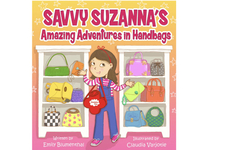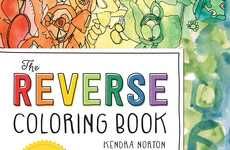
Tisah Tucknott — July 18, 2009 — Business
References: katherinerussellrich
Katherine Russell Rich is currently a full time writer, but has previously dabbled repeatedly in the food service industry. Her skills at writing produced many offers to work at print magazines, and she chose to work as an editor at GQ and Allure.
Katherine Russell Rich’s second book, “Dreaming in Hindi,” landed her the position on Oprah’s list of top summer reads and explores the journey the author took in India, where she learned how to speak Hindi.
10 Questions With Katherine Russell Rich
1. How did you get involved in writing and what motivates you to continue?
I became a writer in a roundabout way. I started out working as an assigning editor in magazines, at places like Allure and GQ. Through spending a lot of time with writers, I learned about writing and finally took the leap.
What motivates me to continue is that half of the writing life that’s superb—you get to have a voice. And you get to do things you’d never would otherwise—for my newest book, Dreaming in India, I got to go to India for a year and learn the (main) language. It was extraordinary. Of course, you have to put up with the other half—uncertainty, a lot of impoverishment—but it’s definitely worth it.
2. How significant are the topics of cool hunting and trend spotting in the world of writing?
Depends on what kind of writing. With magazine writing—very important.
3. How do you define a trend?
A trend is always startling in the beginning, tired and annoying at the end.
4. How do you define cool?
The essence of cool is not caring about being cool.
5. Do you need a culture of innovation to create something that is cool?
No, cool can just as easily exist in a culture of suppression.
6. What is the best way to create an infectious idea, product or service?
First, you have to be hyperaware of what people are thinking, ie, the zeitgeist. After that, you have to be both courageous and foolish, in equal parts, so that you’ll go ahead and try.
7. What is the key to innovation?
See above.
8. What are the most important trends you see in the writing industry?
If you’re a book writer, it’s important to ignore trends, because if you jump on the current bandwagon, you’ll already be old by the time you come out. Better to do the opposite, in fact. This year, when everyone’s publishing books about yoga, you might try thinking about NASCAR racing.
9. Professionally, what do you want to be doing or studying in 10 years?
Exactly what I’m doing now, only better.
10. What are your most important hobbies?
Since I spend so much time in my head for my work, my most important hobbies involve doing stupid stuff. Mindless stuff that gets me out of my cranium. Right now, I play a lot of Bubble Spinner.
Katherine Russell Rich’s second book, “Dreaming in Hindi,” landed her the position on Oprah’s list of top summer reads and explores the journey the author took in India, where she learned how to speak Hindi.
10 Questions With Katherine Russell Rich
1. How did you get involved in writing and what motivates you to continue?
I became a writer in a roundabout way. I started out working as an assigning editor in magazines, at places like Allure and GQ. Through spending a lot of time with writers, I learned about writing and finally took the leap.
What motivates me to continue is that half of the writing life that’s superb—you get to have a voice. And you get to do things you’d never would otherwise—for my newest book, Dreaming in India, I got to go to India for a year and learn the (main) language. It was extraordinary. Of course, you have to put up with the other half—uncertainty, a lot of impoverishment—but it’s definitely worth it.
2. How significant are the topics of cool hunting and trend spotting in the world of writing?
Depends on what kind of writing. With magazine writing—very important.
3. How do you define a trend?
A trend is always startling in the beginning, tired and annoying at the end.
4. How do you define cool?
The essence of cool is not caring about being cool.
5. Do you need a culture of innovation to create something that is cool?
No, cool can just as easily exist in a culture of suppression.
6. What is the best way to create an infectious idea, product or service?
First, you have to be hyperaware of what people are thinking, ie, the zeitgeist. After that, you have to be both courageous and foolish, in equal parts, so that you’ll go ahead and try.
7. What is the key to innovation?
See above.
8. What are the most important trends you see in the writing industry?
If you’re a book writer, it’s important to ignore trends, because if you jump on the current bandwagon, you’ll already be old by the time you come out. Better to do the opposite, in fact. This year, when everyone’s publishing books about yoga, you might try thinking about NASCAR racing.
9. Professionally, what do you want to be doing or studying in 10 years?
Exactly what I’m doing now, only better.
10. What are your most important hobbies?
Since I spend so much time in my head for my work, my most important hobbies involve doing stupid stuff. Mindless stuff that gets me out of my cranium. Right now, I play a lot of Bubble Spinner.
Trend Themes
1. Importance of Trend-spotting - According to Katherine Russell Rich, trend-spotting is very important in magazine writing as it leads to creating engaging content.
2. Infectious Ideas Creating - Being hyper-aware of what people are thinking, and then being courageous to implement it leads to creating an infectious idea, product or service.
3. Ignoring Industry Trends - As per Katherine Russell Rich, ignoring trends in book writing is important as constantly following them would lead to non-uniqueness.
Industry Implications
1. Publishing - Observing trend-spotting techniques can be beneficial for publishers to create niche content for their readers.
2. Marketing and Advertising - Implementing hyper-awareness and taking bold risks can lead to industry-disrupting marketing campaigns.
3. Food Services - Moving from one industry to another, Katherine's approach to writing offers innovative problem-solving tactics for various industries, including food services industry.
3
Score
Popularity
Activity
Freshness























